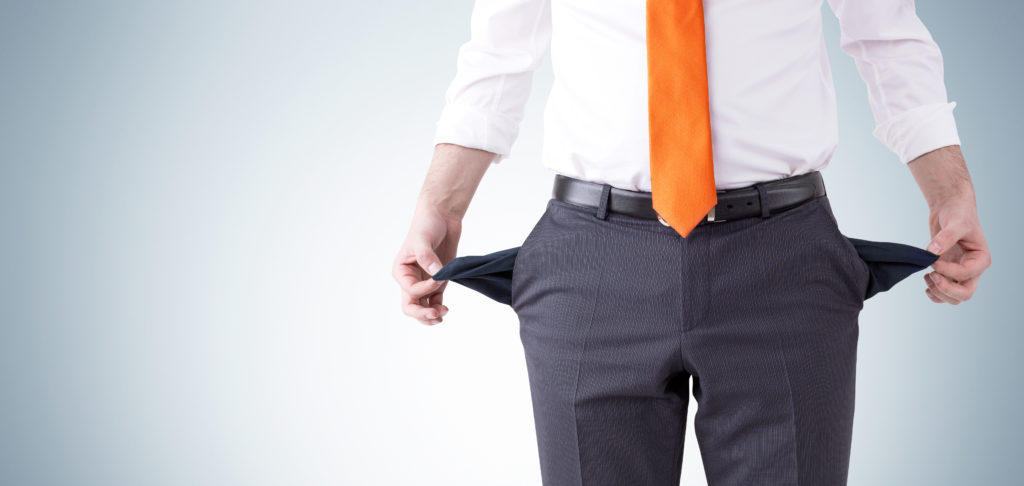Bankruptcy is widely misunderstood. While most know that bankruptcy is some kind of financial last resort, very few people have a strong grasp on the specifics. Does “going bankrupt” simply mean you’re out of money? Does “declaring bankruptcy” just mean that you tell your creditors that you can’t afford to pay them back? Can bankruptcy, in the right situation, actually be a good thing?
Past all that, how can you know if bankruptcy is your only option? When exactly is bankruptcy right for you?
Below, we’ll dive deep into what bankruptcy entails and whether it’s the right way to deal with your debts. While you should absolutely consult with a professional before you decide to declare bankruptcy, these guidelines should at least help you understand the concept.
What exactly is bankruptcy?
Bankruptcy is not a thing in the same sense that your debt is a thing; it’s a legal status designating you as unable to pay off your outstanding debts. Accordingly, you can’t just “declare” bankruptcy on your own (although Michael Scott tried to do as much on “The Office”). Rather, a court has to grant you bankrupt status.
When you declare bankruptcy and a court designates you as bankrupt, you’re saying that there’s no way you can pay back your outstanding debts as they’re currently structured. As a result, the court will work with you and your creditors to impose a structure that will enable you to pay back as much of your debt as possible. As long as you keep up with this repayment program, your creditors won’t be able to sue you or harass you for collections.
Before entering this repayment process, you’ll likely have to enter some type of debt counseling. This counseling can help you get a grip on your finances and figure out if you can actually afford to pay back your debt on your own.
Businesses are also eligible for bankruptcy, but the process is a bit different for them. For the purposes of this article, we’ll focus on the two types of bankruptcy that are available to individual consumers: Chapter 7 bankruptcy and Chapter 13 bankruptcy.
What’s the difference between Chapter 7 bankruptcy and Chapter 13 bankruptcy?
If you’ve been researching bankruptcy, then you’ve probably run into the terms “Chapter 7” and “Chapter 13” already. These two forms of bankruptcy both, ideally, accomplish the same thing: dealing with your outstanding debt for good. Past that, Chapter 7 and Chapter 13 are extremely different.
Chapter 7 bankruptcy
Chapter 7 bankruptcy revolves around the process of asset liquidation. In simplest terms, you give up your possessions in order to get rid of as much debt as possible. Certain possessions, such as your car and your clothes, are exempt from liquidation (after all, the point is to pay off your debts, not put you out on the street).
Once these assets are gone, the funds raised go toward paying down your unsecured debts. With secured debts, the creditor might instead take your collateral or agree to some kind of repayment plan.
An individual can declare Chapter 7 bankruptcy once every seven years. It’s primarily for people who don’t have much in the way of income or assets but are dealing with a large amount of debt.
Chapter 13 bankruptcy
Unlike Chapter 7, Chapter 13 bankruptcy doesn’t require you to get rid of your assets in order to cover your debts. As opposed to liquidation, Chapter 13 is all about reorganization. The goal is less to pay off your debts as fast as possible and more to help you get your footing so that you can pay your debt off consistently and responsibly in the future.
With Chapter 13, the court issues a “stay,” which forbids collection and foreclosure action against you for a limited period. Essentially, the courts are hitting pause on your debt so you can figure out how to pay it.
Next, the courts work with you to restructure and reorganize that debt. Usually, this comes in the form of a repayment plan that stretches over a few years. If you keep up with the repayment plan, you remain protected from foreclosure and collections, and you’ll be able to pay off some of the debt that you owe.
How much debt you pay off is a function of your income, not your total balance. The goal here is to make repayment manageable, not to pay off your creditors as quickly as possible. There are, however, limits to the debt that a Chapter 13 bankruptcy can handle. If you have too much debt, you may not qualify for Chapter 13.
What does bankruptcy cover?
Bankruptcy is a powerful tool for someone struggling to pay down debts, but it isn’t all-powerful. While it covers quite a few forms of debt, it doesn’t cover them all.
What bankruptcy covers
Bankruptcy is best at eliminating unsecured debts, meaning debts for which you didn’t put down collateral. Most commonly, when people declare bankruptcy over unsecured debt, they’re dealing with credit card debts.
Past actually eliminating debt, one of the major benefits of bankruptcy is ceasing harassment from creditors and collection agencies. Declaring bankruptcy puts a pause on this type of collection activity. Sometimes, that harassment might simply be calls and letters that are over the line. Other times, it can be more serious, such as foreclosure or the repossession of property. Bankruptcy has the power to stop that harassment and give you peace of mind.
What bankruptcy doesn’t cover
Bankruptcy can eliminate debts but not liens. Because of this, bankruptcy is not as effective in helping individuals deal with secured debts. Even if you file for bankruptcy, a creditor may still have the power to repossess property that it has a lien on.
Similarly, bankruptcy does not cover “family” debts such as child support or alimony. These types of debts simply don’t fall under the umbrella of bankruptcy.
Bankruptcy doesn’t usually cover student loans either. That’s not to say that student loans never disappear with a bankruptcy. If you can prove “undue hardship” regarding repaying your student loans, they might get included. “Undue hardship” is very difficult to prove, though. Not only do you have to prove that you can’t pay your loans now, but you’ll also have to prove that you stand very little chance of paying them back in the future.
Tax debts also generally don’t get included in bankruptcy filings, but it’s not impossible. If you’re considering declaring bankruptcy due to tax debts, you should consult with a professional and see if it’s viable.
Is bankruptcy right for your situation?
Bankruptcy is a powerful tool for dealing with debts, but it’s not right for everyone. You should ask a few basic questions before you decide to pursue bankruptcy.
First, does bankruptcy cover the debts with which you struggle? Are you dealing mostly with unsecured debts such as credit cards? Or, are you struggling to pay off secured debts such as alimony, child support, or student loans? If you fall into the latter category, then bankruptcy probably isn’t going to do you much good.
Second, do you understand what you stand to lose? If you file for a Chapter 7 bankruptcy, you’re going to have to liquidate many of your assets. While you will likely get to keep your car, you might lose your home as well as many valued possessions that you’ve come to rely upon. Other financial instruments, such as your pension or your life insurance plan, might also face effects. No matter what, bankruptcy is going to require sacrifice. Can you handle it?
Third, consider how declaring bankruptcy might affect those around you. Declaring bankruptcy requires you to open up your personal and financial life to the courts. In a Chapter 7 bankruptcy, you’ll likely lose much of what you own. In a Chapter 13, you might be stuck asking for permission to spend your own money for the next three to five years as part of your reorganized debt.
Past all that, in a Chapter 7 bankruptcy, anyone who cosigned on your debts might have to pay them off even as you go through the bankruptcy process. Before you even consider bankruptcy, triple-check to make sure you won’t adversely affect anyone else’s life without realizing it.
If you’re really struggling with your debt and it’s eligible for bankruptcy, and you won’t drag anyone else down with you, then bankruptcy might at least be worth exploring. Remember, though: it’s not a decision to take lightly.
What are the best alternatives to bankruptcy?
Before you decide whether bankruptcy is right for you, realize that many other options exist for dealing with the things that bankruptcy deals with.
The Fair Debt Collection Practices Act
If your main concern is harassment from creditors and collection agencies, then you may have more power than you think. The Fair Debt Collection Practices Act prohibits debt collectors from abusing their power to get you to pay up.
That doesn’t mean that debt collectors can’t call you or send you mail demanding that you pay them back. However, there are set limits to their ability to contact you and the ways they can communicate with you. For instance, collectors cannot repeatedly contact you before 8 a.m. or after 9 p.m. They can’t threaten you with violence or use profane language. They can’t send you papers resembling legal documents. They can’t call you at work if your employer forbids it. There’s more to the law than just what we’ve discussed here, so if you feel like your debt collectors are going over the line, look into the FDCPA.
Credit counseling
Many people have the ability to pay down their debts on their own; they just aren’t sure how to do it. Credit counseling helps individuals make their debt easier to deal with while aiding them in drawing up plans to repay that debt efficiently and responsibly.
Credit counselors are generally non-profit agencies that work with individuals saddled with significant debts that they struggle to pay. Credit counselors provide education, but more than that, they negotiate with your creditors on your behalf to drive down interest rates and make repayment easier. Credit counselors don’t do anything that you can’t do on your own, but they have the experience and negotiation skills to get things done on behalf of their clients.
Debt consolidation
If you really can’t afford to pay down your debts as they stand now, but you know bankruptcy isn’t right for you, then debt consolidation might be just what you need.
In debt consolidation, you turn many different debts into a single debt. Ideally, this debt is more affordable due to a single lower monthly payment and reduced interest rates. Instead of trying to pay down a bunch of different debts, you just worry about one.
There are many different forms of debt consolidation. The most common is debt consolidation via personal loan, where you work with a bank or other lender to take out a loan equal to the amount of your debts. You use that loan to pay off those debts and then focus on paying down the loan. Since personal loans usually have lower interest rates than unsecured debts such as credit cards, this approach can save you a lot of money in the end.
Debt Settlement
Other methods include debt settlement, which sometimes falls under the debt consolidation umbrella. With debt settlement, you stop paying your creditors and instead pay into an escrow account managed by a debt settlement company, essentially consolidating your debt payments. When that account hits a certain threshold, the debt settlement company approaches your creditors on your behalf with an offer: take a lump sum payment for a fraction of your debt now and forgive the remaining debt. Many creditors take the deal, happy to have the easy money now rather trying to collect your debt into perpetuity.
If you’re struggling with debt and still aren’t sure where to turn, National Debt Relief can help. Our reviews speak for themselves; you can rely on us.





